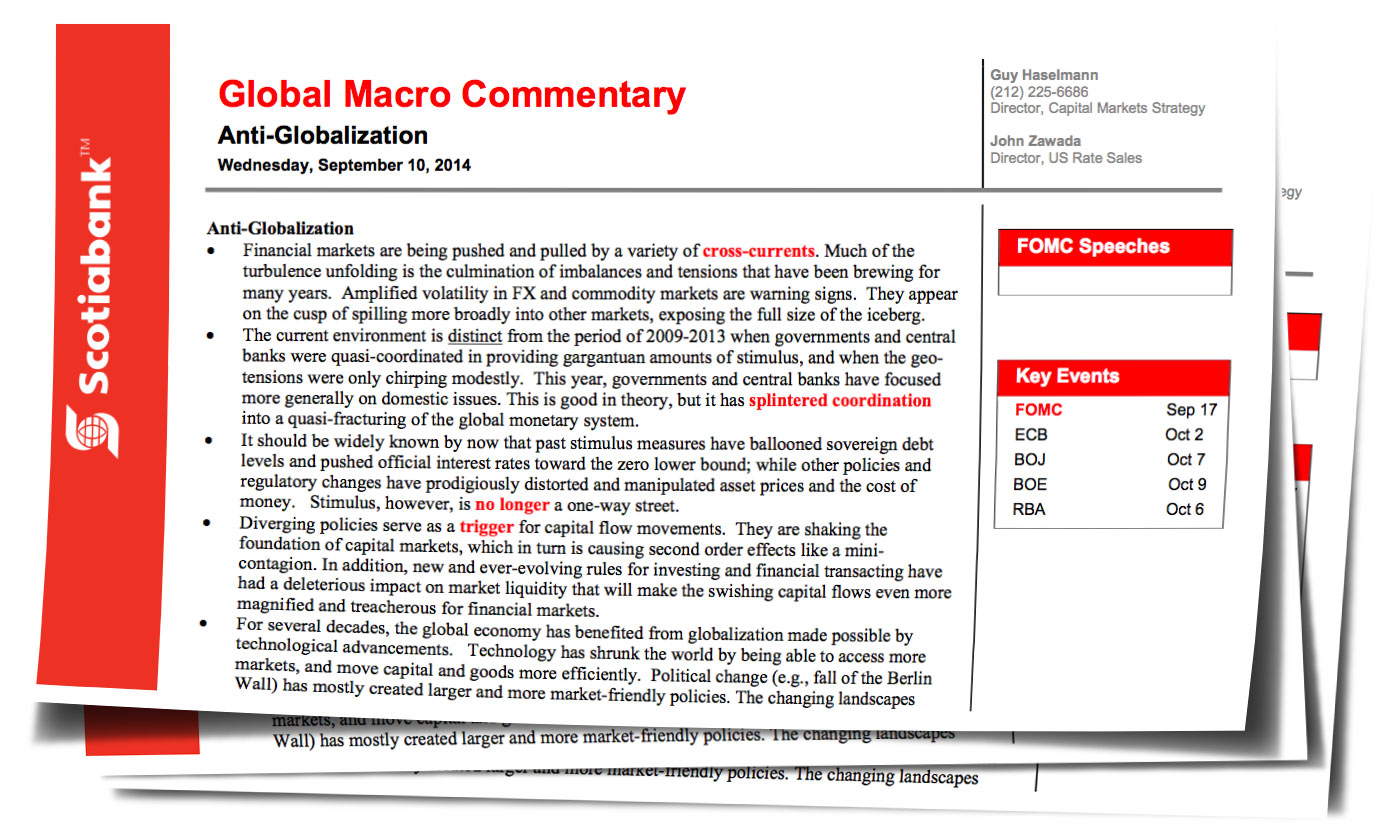Anti-Globalization
by Guy Haselmann, Director, Capital Markets Strategy, Scotiabank GBM
• Financial markets are being pushed and pulled by a variety of cross-currents. Much of the turbulence unfolding is the culmination of imbalances and tensions that have been brewing for many years. Amplified volatility in FX and commodity markets are warning signs. They appear on the cusp of spilling more broadly into other markets, exposing the full size of the iceberg.
• The current environment is distinct from the period of 2009-2013 when governments and central banks were quasi-coordinated in providing gargantuan amounts of stimulus, and when the geo- tensions were only chirping modestly. This year, governments and central banks have focused more generally on domestic issues. This is good in theory, but it has splintered coordination into a quasi-fracturing of the global monetary system.
• It should be widely known by now that past stimulus measures have ballooned sovereign debt levels and pushed official interest rates toward the zero lower bound; while other policies and regulatory changes have prodigiously distorted and manipulated asset prices and the cost of money. Stimulus, however, is no longer a one-way street.
• Diverging policies serve as a trigger for capital flow movements. They are shaking the foundation of capital markets, which in turn is causing second order effects like a mini- contagion. In addition, new and ever-evolving rules for investing and financial transacting have had a deleterious impact on market liquidity that will make the swishing capital flows even more magnified and treacherous for financial markets.
• For several decades, the global economy has benefited from globalization made possible by technological advancements. Technology has shrunk the world by being able to access more markets, and move capital and goods more efficiently. Political change (e.g., fall of the Berlin Wall) has mostly created larger and more market-friendly policies. The changing landscapes unleashed innovative capacities that typically provided great benefits and opportunities. While these factors will continue to exist, they are being met with the strongest headwinds in decades.
• Protectionism, nationalism, and separatist movements could begin to have great negative impacts. The social contract between people and governments has been breaking down, as witnessed in voting booths and through violent protests. Going forward, portfolios could begin to be impacted, as they activate large capital flows between sectors, securities, asset classes, and geographic regions. Investors are probably ill-equipped for a market shift from a state of low- volatility and herd-mentality investing, toward one characterized by greater bifurcation and a sustained spike in volatility.
• Markets have largely ignored the wars and tensions occurring in the Middle East and elsewhere. This is because, while everyone recognizes the tragedies occurring at a human level, investors realize that most disputes are far away with little effect (so far) at the investment level. In addition, troubles abroad can mean capital inflows for the US (“a cleaner dirty shirt”).
• A successful Scottish independence vote next week could be the game-changer. Until earlier this week, most believed there was no chance of Scotland breaking from the UK. Even after a flip in one poll showed a 1 point advantage for the “yes” campaign (for independence), most still assumed that it would not occur because they assumed that fear of what it would entail would prevail. The “no” camp fuels the fear by labelling such a scenario as an act of “madness”.
• However, in all likelihood, a vote for independence may not be as far-fetched and radical as the “no” campaigners suggest. The transition into independent statehood could actually go fairly smoothly with particulars negotiated in a fair and level-headed manner. There will be initial costs, but for supporters, pride trumps (unknown) costs. Fear about using the British Pound is also over-hyped as the Pound is a highly tradable freely-convertible currency. Moreover, Scotland could set up a currency board monetary authority in less than one day.
• The arguments and grassroots campaign of the “”yes” camp has been superior in most aspects to the disjointed fear-emphasis campaign of the “no” camp. Due to the momentum and organization of the “yes” camp, the odds of “yes” are better than even-money (even though betting organizations put it at 36%).
• The bottom line is that a “yes” vote is a distinct possibility; one that markets are not fully prepared for. This is because it would encourage separatist movements across Europe and beyond. As these types of uncertainties and anti-globalization aspects mount, long-dated USD- denominated Treasuries should be the marginal benefactor.
• In addition, tomorrow is 9/11 and the last of the August refunding auctions. The other auctions were purchased at decent levels after reasonable concessions, helping to place the securities in stronger hands. It was also a good sign that German Bunds fully regained early losses today. These are just a few reasons to own long Treasuries. Too many cross-currents and too much yield pick-up and carry makes it too soon to focus on the 2015 Fed (just yet).
• “...And the hypnotic splattered mist was slowly lifting...” - Bob Dylan
Read/Download this report below:













